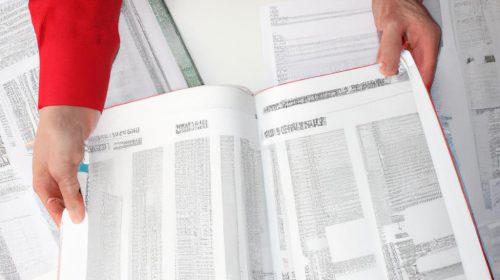Rent Collection and Financial Management: Essential Guidelines for Real Estate Property Management
Rent collection and financial management are crucial aspects of real estate property management. With the increasing complexity and diversity in the rental market, property managers need to implement effective guidelines to ensure a smooth rent collection process and efficient financial management. For instance, consider a hypothetical case where a property manager oversees multiple properties with various tenants. Without proper guidelines in place, there could be confusion regarding rent payment deadlines, methods of payment, and tracking late payments, ultimately leading to financial losses for both the property owner and the property management company.
To address these challenges, this article aims to provide essential guidelines for real estate property managers on rent collection and financial management. These guidelines encompass strategies for establishing clear communication channels with tenants, implementing robust systems for collecting rents promptly, maintaining accurate records of all transactions, and ensuring compliance with legal requirements related to finance in the rental industry. By following these guidelines, property managers can streamline their operations and maximize revenue while building trust with their clients.
In conclusion, effective rent collection and financial management practices are vital for successful real estate property management. This article will delve into specific guidelines that allow property managers to navigate through complex scenarios such as handling diverse tenant profiles or managing multiple properties simultaneously. By implementing these strategies diligently, property managers can enhance their efficiency, minimize financial losses, and maintain a strong reputation in the industry.
Understanding Rent Collection Processes
Rent collection is a fundamental aspect of real estate property management, ensuring the smooth operation and financial stability of rental properties. By implementing effective rent collection processes, property managers can minimize tenant delinquencies and maintain positive cash flow. This section explores the key components involved in rent collection and provides essential guidelines for successful implementation.
To illustrate the importance of efficient rent collection, consider a hypothetical scenario where a property manager oversees a residential complex with multiple tenants. In this case, timely rent payments are crucial to cover operating expenses such as maintenance, utilities, and mortgage payments. Failure to collect rents promptly may result in budgetary constraints that hinder necessary repairs or even put the property’s financial viability at risk.
Implementing an organized approach to rent collection can help mitigate these risks and ensure consistent revenue stream. To achieve this goal, property managers should consider incorporating the following strategies into their practices:
- Set clear expectations: Clearly communicate payment due dates and consequences for late or non-payment.
- Provide multiple payment options: Offer convenient methods such as online platforms or automatic bank transfers to facilitate prompt payment.
- Regularly communicate with tenants: Maintain open lines of communication to address any concerns or issues related to rent payments.
- Enforce policies consistently: Treat all tenants equally when it comes to enforcing late fees or pursuing legal action if necessary.
Table 1 presents a comparison of different approaches to rent collection commonly used by property managers. It highlights the advantages and disadvantages associated with each method:
| Method | Advantages | Disadvantages |
|---|---|---|
| Cash | Immediate access to funds | Increased risk of theft or loss |
| Checks | Physical record of transactions | Potential delays in processing |
| Online Payment Systems | Convenient for both landlords and tenants | Transaction fees may apply |
| Automatic Bank Transfers | Reliable automated process | Issues with banking information or insufficient funds |
By understanding the various rent collection methods and selecting the most appropriate approach for their specific property, managers can streamline payment processes and foster positive tenant relationships.
In conclusion, a well-executed rent collection process is essential for effective real estate property management. By setting clear expectations, providing convenient payment options, maintaining open communication, and enforcing policies consistently, property managers can ensure timely rent payments and mitigate financial risks.
Establishing Clear Rent Payment Policies
Understanding the intricate processes involved in rent collection is crucial for effective property management. Now, let’s delve into another essential aspect of managing rental properties — establishing clear rent payment policies. These policies provide a framework that ensures timely and consistent rent payments while promoting positive tenant-landlord relationships.
To illustrate the importance of clear rent payment policies, consider this hypothetical scenario: Imagine a residential complex with multiple units where tenants have different lease start dates. Without well-defined guidelines on when and how to make payments, confusion may arise among tenants resulting in delayed or missed payments. Consequently, this can disrupt cash flow and hinder financial planning for property owners/managers.
Here are some key considerations when establishing clear rent payment policies:
- Due Dates: Clearly define specific due dates by which tenants must submit their monthly rent payments. This allows both parties to anticipate incoming revenue accurately and plan expenses accordingly.
- Accepted Payment Methods: Specify acceptable modes of payment such as checks, online transfers, or automatic deductions from bank accounts. Providing convenient options encourages prompt payments and reduces instances of late fees.
- Late Fees Policy: Outline penalties for late payments to incentivize timely remittance and discourage any potential delays.
- Grace Periods: Determine if there will be grace periods after the due date during which no late fees will be incurred but emphasize that full payment should still be made promptly within this period.
Creating a comprehensive policy helps foster transparency, consistency, and adherence to deadlines among tenants. It also promotes trust between landlords/property managers and tenants, leading to smoother operations overall.
Table – Benefits of Clear Rent Payment Policies:
| Benefit | Explanation |
|---|---|
| Timely Payments | Encourages tenants to pay on time |
| Cash Flow Management | Facilitates accurate prediction of income |
| Positive Relations | Builds trust and fosters better relationships |
| Consistent Revenue | Reduces disruptions in cash flow |
By establishing clear rent payment policies, property owners/managers can streamline their operations while ensuring a fair and efficient rental process. In the subsequent section, we will explore how to set up robust systems that facilitate seamless rent collection.
Transition into the next section:
Now that we have covered the importance of establishing clear rent payment policies, let’s move on to setting up efficient rent collection systems. This involves implementing technology-driven solutions and leveraging automation for smoother financial management processes.
Setting Up Efficient Rent Collection Systems
Having established clear rent payment policies, it is crucial for real estate property managers to set up efficient rent collection systems. These systems not only streamline the process but also ensure timely and accurate payments from tenants. By implementing effective rent collection systems, property managers can enhance their financial management practices and maintain a healthy cash flow.
Example:
To illustrate the importance of efficient rent collection systems, consider a hypothetical scenario where a property manager oversees an apartment complex with multiple tenants. Without an organized system in place, tracking individual rental payments becomes challenging, resulting in delayed or missed payments. This situation not only creates frustration for both parties involved but also hampers the smooth operation of the property.
Implementing effective rent collection systems involves several key considerations that help maximize efficiency and minimize complications:
- Utilize online platforms or software specifically designed for rent collection.
- Set up automated reminders for tenants regarding upcoming due dates.
- Offer various secure payment methods such as direct bank transfers, credit card payments, or mobile wallets.
- Maintain detailed records of all transactions and communications related to rent collections.
These strategies contribute to smoother operations by reducing administrative burdens and ensuring prompt rental income. To further understand how these elements work together seamlessly, let’s examine a table highlighting their benefits:
| Benefit | Description |
|---|---|
| Time-saving | Online platforms automate tasks like invoicing and receipt generation, freeing up valuable time for property managers. |
| Improved tenant experience | Automated reminders and flexible payment options make it convenient for tenants to pay promptly and avoid late fees or penalties. |
| Increased transparency | Detailed records provide clarity on transaction history, making it easier to resolve any disputes or discrepancies with tenants. |
| Enhanced financial control | Accurate recordkeeping enables better oversight of revenue streams, allowing property managers to identify trends or potential issues early on. |
By implementing these rent collection systems, property managers can ensure a more efficient and streamlined process that benefits both tenants and themselves. Next, we will explore the importance of ensuring timely rent reminders and notifications to further optimize financial management practices.
Ensuring Timely Rent Reminders and Notifications
By proactively engaging tenants with regular communication, property managers can significantly reduce instances of late or missed payments. Let us explore some essential strategies to implement effective rent reminders and notifications.
Paragraph 1:
For instance, consider a hypothetical scenario where a property manager oversees multiple rental units across various locations. In this case, implementing an automated reminder system through email or SMS can prove immensely beneficial. This approach allows property managers to effortlessly send payment reminders to all tenants simultaneously, minimizing the chances of overlooking any individual tenant’s due date. Additionally, incorporating personalized messages that highlight specific details such as outstanding balances or upcoming lease renewals fosters a sense of urgency among tenants.
To effectively execute timely rent reminders and notifications, property managers should consider the following key guidelines:
- Utilize technology-driven solutions like property management software or mobile applications that offer built-in notification features.
- Tailor your messages based on tenant preferences by providing options for receiving alerts via email, text message, or push notifications.
- Set up automatic triggers within the system to initiate reminders at predetermined intervals before the due date.
- Maintain consistency in sending reminders by establishing a regular schedule (e.g., one week prior to the due date) while being mindful not to inundate tenants with excessive communication.
Paragraph 2:
In order to visualize these strategies more clearly, let us examine a table showcasing different methods of rent reminders and their associated benefits:
| Method | Benefits |
|---|---|
| Automated Email Reminders | Ensures consistent communication |
| Personalized SMS Notifications | Enhances tenant engagement |
| Push Notifications | Instantly delivers urgent payment updates |
| Dedicated Mobile Applications | Provides convenient access to payment information |
This table highlights the various methods available for rent reminders and emphasizes their respective advantages. Property managers can choose the most suitable approach based on their tenants’ preferences, property size, and logistical considerations.
Paragraph 3:
By implementing timely rent reminders and notifications, property managers foster a proactive environment that encourages prompt payments from tenants. This not only improves cash flow but also strengthens tenant relationships by demonstrating professionalism and attentiveness towards their needs. Moreover, efficient communication helps mitigate potential conflicts arising from late payments or misunderstandings regarding due dates. With an established system in place, property managers can now explore effective strategies for handling late rent collection without compromising tenant satisfaction.
Transition into subsequent section: Building upon these essential guidelines for timely rent reminders and notifications, let us delve into implementing effective late rent collection strategies to address any instances of delayed or missed payments.
Implementing Effective Late Rent Collection Strategies
Building on the importance of timely rent reminders and notifications, effective late rent collection strategies are vital for real estate property management. By implementing these strategies, property managers can minimize the occurrence of late payments and ensure a smoother financial management process.
Paragraph 1:
To illustrate the significance of efficient rent collection strategies, consider the following example: A property manager oversees several rental units in a residential complex. One tenant consistently pays their rent late every month, causing cash flow issues and administrative burdens for the property manager. This situation highlights the need for proactive measures to address late payments promptly and effectively.
Paragraph 2:
Implementing effective late rent collection strategies involves several key considerations:
- Clear Late Payment Policy: Property managers should establish a transparent policy that clearly outlines consequences for late payment, such as penalties or potential legal actions.
- Timely Communication: Promptly contact tenants when they miss their payment deadline through various channels (email, text message, or phone call) to remind them of their obligation.
- Flexible Payment Options: Offer convenient methods for tenants to make payments, including online platforms or automatic deductions from bank accounts.
- Consistent Follow-up: Regularly follow up with tenants who have overdue payments to emphasize the importance of meeting their financial obligations.
Table – Emotional response evoking table highlighting impacts of ineffective late rent collection:
| Impact | Description | Consequence |
|---|---|---|
| Cash Flow Disruptions | Delays in receiving rental income | Difficulty covering expenses |
| Administrative Burden | Increased time spent chasing overdue payments | Reduced efficiency |
| Strained Landlord-Tenant Relationships | Tension arising from repeated non-compliance | Potential lease terminations |
| Legal Complications | Possible eviction proceedings | Financial losses |
Paragraph 3:
By implementing efficient rent collection strategies like those outlined above, property managers can maintain a steady cash flow, reduce administrative burdens, foster positive landlord-tenant relationships, and avoid legal complications. These strategies not only benefit the property manager but also contribute to overall tenant satisfaction and retention.
Utilizing technology for streamlined financial management offers additional tools and benefits that can further enhance rent collection processes and ensure efficient operations in real estate property management.
Utilizing Technology for Streamlined Financial Management
Building upon the implementation of effective late rent collection strategies, it is also crucial for real estate property managers to leverage technology for streamlined financial management. By embracing technological advancements, property managers can enhance their efficiency and accuracy in handling financial tasks, ultimately contributing to better overall management of rental properties.
Utilizing Technology for Streamlined Financial Management:
Technology has revolutionized various industries, including real estate property management. With the right tools and software solutions, property managers can automate numerous financial processes that were traditionally manual and time-consuming. For instance, let’s consider a hypothetical case study involving a property manager named Sarah who manages multiple rental units across different locations. By adopting cloud-based accounting software specifically designed for real estate professionals, Sarah can centralize her financial records, streamline rent collections, track expenses, generate detailed reports, and even manage tenant communication – all within one platform. This integration eliminates the need for manual data entry and reduces human errors while increasing productivity.
To further highlight the benefits of utilizing technology in financial management within real estate property management, here are some key advantages:
- Improved Accuracy: Automation minimizes the risk of human error during calculations or recording transactions.
- Enhanced Efficiency: Automated systems allow quick access to financial data and reduce time spent on administrative tasks.
- Increased Transparency: Property owners and tenants gain visibility into their respective accounts through online portals or apps.
- Simplified Reporting: Software solutions offer customizable reporting options to provide comprehensive insights into income statements, expense tracking, vacancies analysis, etc.
Table – Benefits of Utilizing Technology in Financial Management:
| Advantages | Description |
|---|---|
| Improved Accuracy | Automation minimizes the risk of human error during calculations or recording transactions. |
| Enhanced Efficiency | Automated systems allow quick access to financial data and reduce time spent on administrative tasks. |
| Increased Transparency | Property owners and tenants gain visibility into their respective accounts through online portals or apps. |
Incorporating technology in financial management not only streamlines daily operations but also fosters a more efficient relationship between property managers, property owners, and tenants. By embracing software solutions tailored to the real estate industry, property managers can optimize their rent collection processes, ensure accurate record-keeping, enhance communication channels, and provide transparency to all stakeholders involved.
With the integration of technology in financial management discussed above, it is evident that real estate property managers have access to various tools that significantly improve efficiency and accuracy in managing rental properties. The following section will explore another critical aspect: ensuring compliance with relevant regulations and legal requirements for successful rent collection and financial management within the real estate sector.



